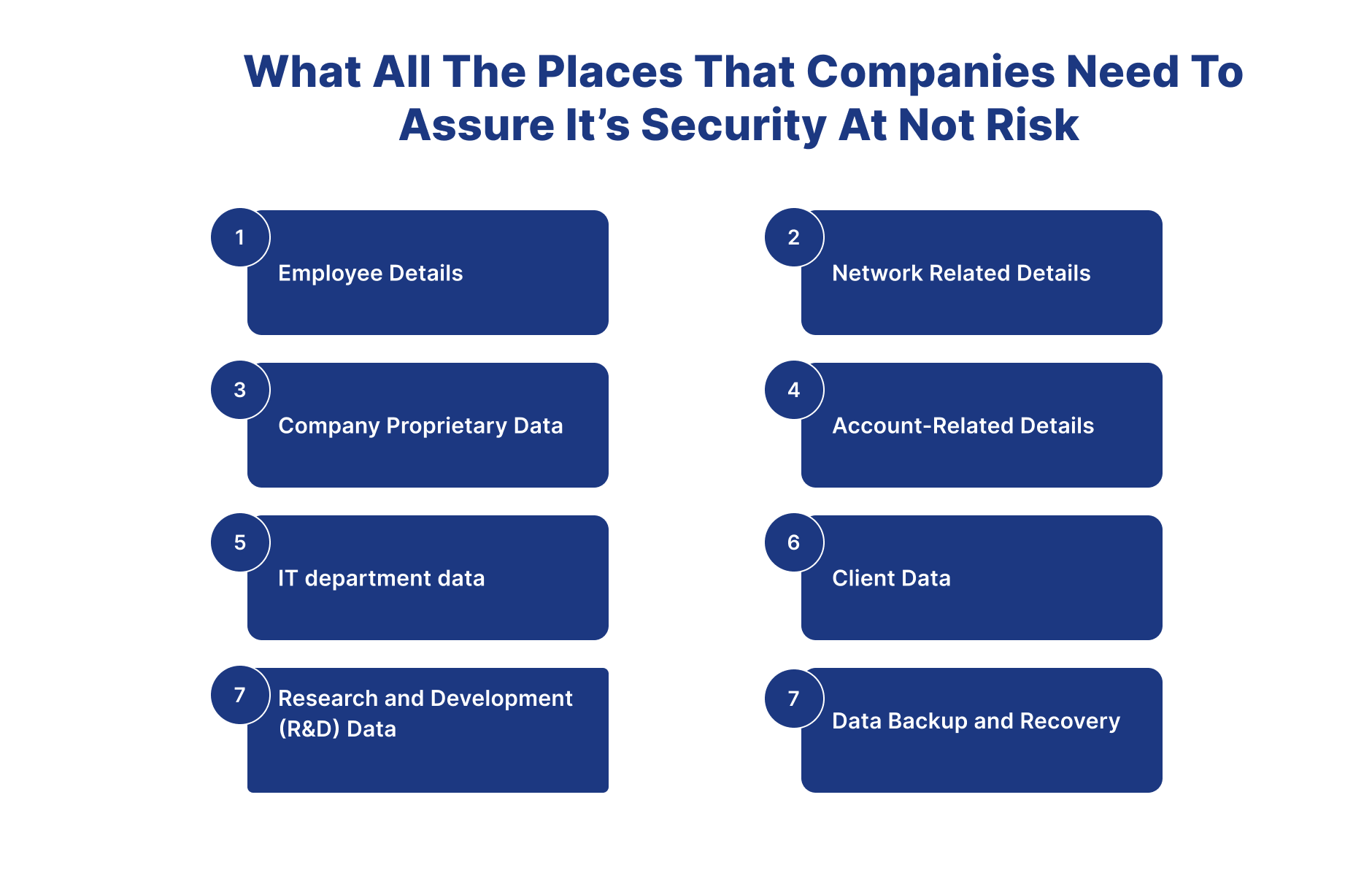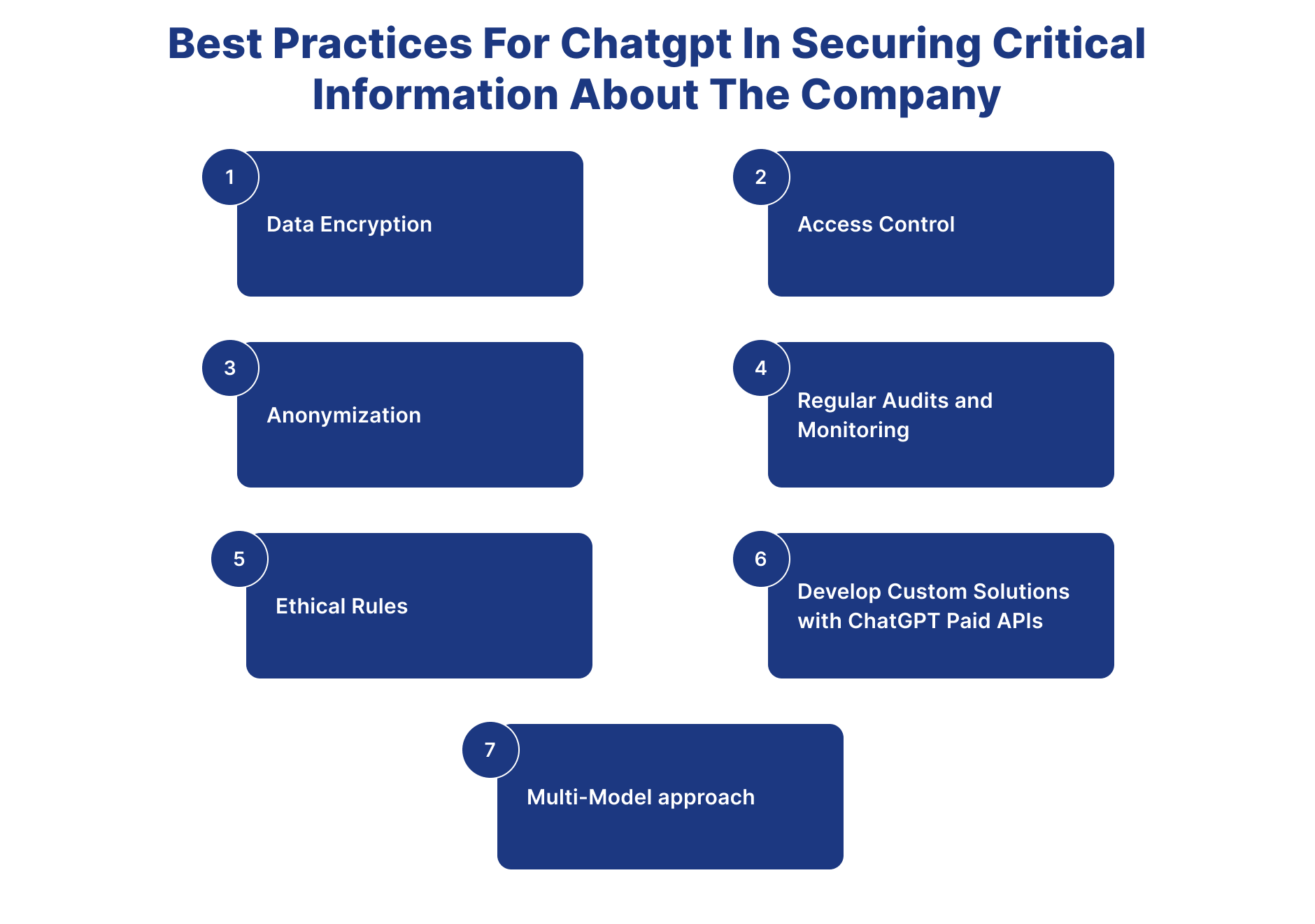ChatGPT in Securing Critical Information About the Company
Introduction

- Using artificial intelligence (AI) solutions like ChatGPT may greatly improve corporate operations, streamline workflows, and increase productivity in today's quickly changing business landscape. However, given the abundance of sensitive data and privacy issues, it is imperative to protect vital information. In this article, we'll look at how businesses may use chatgpt in securing critical information about the company.
Understanding the Power of ChatGPT
- Powered by OpenAI, ChatGPT is a state-of-the-art AI language model that can produce text replies that resemble those of a human being in response to input cues. Because of its adaptability, it may be used to a range of jobs, including project management, content creation, brainstorming sessions, and customer service. ChatGPT's capacity to understand and react to natural language allows it to automate repetitive operations and improve communication, saving businesses significant time and money.
Enhancing Company Operations
-
One of the main benefits of ChatGPT is its capacity to promote smooth teamwork and communication. As a virtual assistant, ChatGPT may answer standard questions, set up appointments, give task updates, and even help with project planning. By assigning these responsibilities to ChatGPT, staff members may concentrate on more important projects that foster innovation and corporate expansion.
-
Additionally, ChatGPT may be an invaluable information base for the organization. By simply asking ChatGPT, staff members may obtain information on corporate rules, processes, and best practices, doing away with the need for manual documentation and breaking down information silos. Furthermore, ChatGPT has the capacity to evaluate massive amounts of data and produce insightful analysis that enables businesses to make wise decisions and outperform their rivals.
What All The Places That Companies Need To Assure It’s Security At Not Risk

1. Employee Details
-
Companies store a wealth of information about their employees, including personal data (such as names, addresses, and contact information), financial details (like salary, bank account numbers, and tax information), and employment records (such as performance reviews and disciplinary actions).
-
Maintaining the confidentiality of employee information is essential for safeguarding people's privacy and lowering the possibility of fraud or identity theft. Unauthorised access to sensitive information may result in major repercussions, such as financial losses and harm to the employee's and the business's reputation.
-
Moreover, organizations must put strict measures in place to protect employee data from unauthorized access, disclosure, or misuse to comply with data protection laws, such as the US Health Insurance Portability and Accountability Act (HIPAA) and the General Data Protection Regulation (GDPR) in Europe.
2. Network Related Details
-
Network-related facts include information about the company's network infrastructure, such as IP addresses, server settings, network architecture, and security protocols.
-
Protecting sensitive data and the integrity and confidentiality of the company's internal network requires the security of network-related information. Malicious actors frequently use network vulnerabilities to initiate cyberattacks, gain illegal access to corporate systems, and steal important data.
-
Protecting network information can help businesses lower their risk of data breaches, service interruptions, and monetary losses from cyber disasters. To reduce these threats and keep the network architecture resilient, strong security mechanisms like intrusion detection systems, firewalls, and encryption protocols must be implemented.
3. Company Proprietary Data
-
Company-related details include financial records, trade secrets, proprietary data, and strategic plans, among other sensitive information vital to the organization's operations.
-
Protecting company-related information is critical to maintaining a firm's competitive edge, intellectual property, and reputation. Theft or unauthorized exposure to this information can have serious repercussions, such as harm to a brand's reputation, legal issues, and market share losses.
-
Businesses need to implement strong cybersecurity measures to safeguard firm information from insider threats, foreign cyberattacks, and unintentional data breaches. These measures include encryption, access restrictions, and data loss prevention (DLP) programs.
4. Account-Related Details
-
Account-related information refers to credentials and access privileges connected to user accounts, such as usernames, passwords, security tokens, and permissions.
-
Maintaining the confidentiality of account information is essential for avoiding unwanted access to business data, apps, and systems. Cybercriminals may use compromised accounts to steal confidential data, interfere with company operations, or carry out fraudulent actions.
-
Businesses should use robust authentication methods, such as multi-factor authentication (MFA) and password management procedures, to reduce the risk of account penetration. Routine user account activity audits and monitoring can also identify and stop unauthorized access attempts.
5. IT department data
-
Source code, software architectural diagrams, project documentation, development environments, and other facets of the software development lifecycle are all considered development-related elements.
-
Ensuring the integrity of software products, protecting intellectual property, and maintaining the privacy of private information all depend on protecting development-related facts.
-
To prevent unwanted access, alteration, or exposure to development-related information, businesses need to have strong security measures in place. Some examples of these measures are version control systems, code review procedures, and secure coding techniques. Vulnerabilities in the development environment may be found and fixed with the use of routine penetration tests and security assessments.
6. Client Data
-
"client-related details" refers to a broad category of customer information, such as financial records, contracts, correspondence, service agreements, and personal data.
-
The security of client-related information is crucial for maintaining customer trust, confidentiality, and regulatory compliance. Client data breaches may result in fines, legal ramifications, and harm to the company's reputation.
-
Businesses should have strong data security measures in place, such as encryption, access restrictions, and data encryption, to safeguard client-related information. Ensuring that client data is handled safely and in conformity with applicable rules and regulations may be facilitated by conducting regular security audits and compliance assessments.
7. Research and Development (R&D) Data
-
R&D data includes experimental data, product prototypes, innovation initiatives, and confidential research discoveries.
-
Maintaining a competitive advantage, safeguarding future income streams, and safeguarding the company's investment in research efforts depend on the security of R&D data.
-
R&D data breaches can affect long-term development and sustainability by stealing intellectual property, reducing a competitive edge, and harming innovative capabilities.
8. Data Backup and Recovery
-
Data backup and recovery procedures entail making and keeping copies of data to aid in the restoration of important data in the case of data loss, corruption, or ransomware attacks.
-
Maintaining regular data backups to cloud-based platforms or secure off-site locations promotes data resilience and allows for quick recovery in the case of system failures or data breaches.
-
Inadequate implementation of strong data backup and recovery protocols may lead to irreversible data loss, extended periods of non-operation, non-compliance with regulations, and financial consequences for the organization.
Best Practices For Chatgpt In Securing Critical Information About The Company ?

1. Data Encryption
- One essential component of protecting sensitive data is data encryption. It entails encrypting the information so that only people with permission may access it. Encryption should be used for ChatGPT both in transit (when data is being sent between systems) and at rest (when the data is being stored). This guarantees that even in the unlikely event that someone uninvited has access to the material, they will be unable to decode it without the right decryption key. In this way company can use chatgpt in securing critical information about the company
2. Access Control
- Limiting access to ChatGPT models and data requires access control measures. This entails implementing user authentication methods to confirm users' identities prior to providing them access. Furthermore, according to the user's job within the organization, varying degrees of access rights can be assigned by implementing role-based access control, or RBAC. Unauthorized data access is greatly decreased when access is limited to authorized persons alone. In this way company can use chatgpt in securing critical information about the company.
3. Anonymization
- The practice of eliminating or hiding personally identifying information from data sets is known as anonymization. Pseudonyms or generic IDs can be used to replace identifying data in ChatGPT, hence reducing the possibility of sensitive information being exposed. For instance, the data might be anonymized by employing distinct identities or tokens rather than providing ChatGPT with client names and contact information. This guarantees that the individuals' identities are secured even if the data is hacked. In this way company can use chatgpt in securing critical information about the company.
4. Regular Audits and Monitoring
- Regular security audits and monitoring are crucial for ChatGPT systems to identify and resolve possible vulnerabilities or security issues. Audits methodically review security controls, settings, and access records to find violations of defined security policies. Monitoring, on the other hand, continuously monitors ChatGPT systems for unauthorized access attempts or questionable activity. By periodically performing audits and monitoring, organizations may proactively detect and reduce security risks prior to their escalation into big events. In this way company can use chatgpt in securing critical information about the company.
5. Ethical Rules
- In order to guarantee the technology's ethical and responsible use, it is imperative to establish explicit ethical principles and protocols for ChatGPT usage. Examples of ethical Considerations include justice, openness, privacy, and bias reduction. When utilizing ChatGPT, organizations should create thorough rules that specify allowable use cases, data management procedures, and decision-making procedures. Furthermore, training courses and awareness campaigns may assist in informing staff members about the moral ramifications of utilizing AI technology and promote adherence to moral standards in their daily work. In this way company can use chatgpt in securing critical information about the company.
6. Develop Custom Solutions with ChatGPT Paid APIs
- Leverage the capabilities of ChatGPT's paid APIs to create tailored solutions for specific use cases. For instance, you could develop a platform that incorporates a predefined set of inputs to construct prompts automatically. These prompts can then be executed through the ChatGPT API, with the responses displayed directly on the platform. This approach enables the seamless integration of advanced conversational AI into your applications, enhancing user interaction and functionality. In this way company can use chatgpt in securing critical information about the company.
7. Multi-Model approach
- Multiple AI Models can be trained to extract named entity or critical details from the prompt and such prompt can be passed to ChatGPT. In this way company can use chatgpt in securing critical information about the company.
Conclusion
-
In conclusion, there are a lot of advantages to integrating ChatGPT into business processes, including increased productivity, improved collaboration, and streamlined workflows. When using this potent AI technology, enterprises must, however, put data security and privacy first. While taking use of chatgpt in securing critical information about the company, businesses may guarantee that confidential data is kept safe by putting best practices like encryption, access limits, anonymization, frequent audits, and ethical standards into place.
-
Future developments in natural language comprehension, security features, contextual awareness, and interface with current security systems are all intriguing prospects for ChatGPT. ChatGPT models will advance to become increasingly more skilled at protecting sensitive company data and provide insightful analysis to promote business success through ongoing learning and development.
-
Through the use of chatgpt in securing critical information about the company and strict adherence to security protocols, enterprises may fully leverage AI technology to optimize workflows, enhance productivity, and maintain a competitive edge in the quickly changing market. ChatGPT may be a useful tool for protecting sensitive data and promoting innovation and expansion inside the company.
Contact Us
Frequently Asked Questions
How can ChatGPT help secure critical company information?
ChatGPT can help by analyzing security policies, identifying potential vulnerabilities in documentation, generating security awareness content, and providing guidance on information classification and protection protocols.
What role does ChatGPT play in information security training?
ChatGPT plays a role by creating personalized security training content, simulating phishing scenarios, explaining security concepts in simple terms, and providing interactive learning experiences for employees.
How does ChatGPT assist with compliance documentation?
ChatGPT assists by drafting compliance policies, explaining regulatory requirements, generating audit checklists, and helping organizations maintain consistent documentation standards for information security.
What are the security considerations when using ChatGPT for sensitive information?
Security considerations include data privacy protection, avoiding input of confidential information, implementing access controls, ensuring compliance with data protection regulations, and maintaining audit trails for AI interactions.

